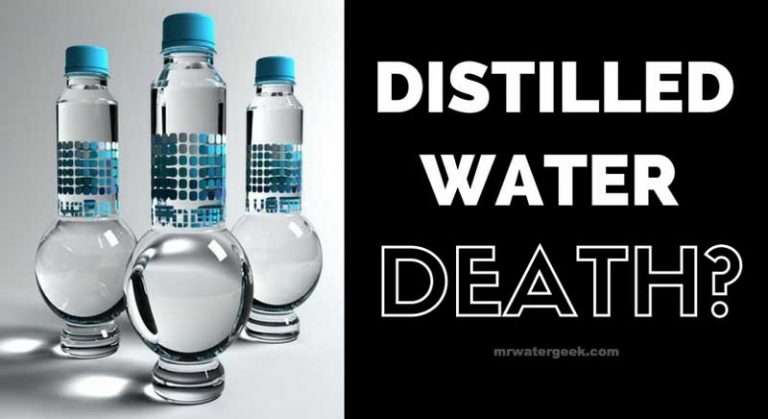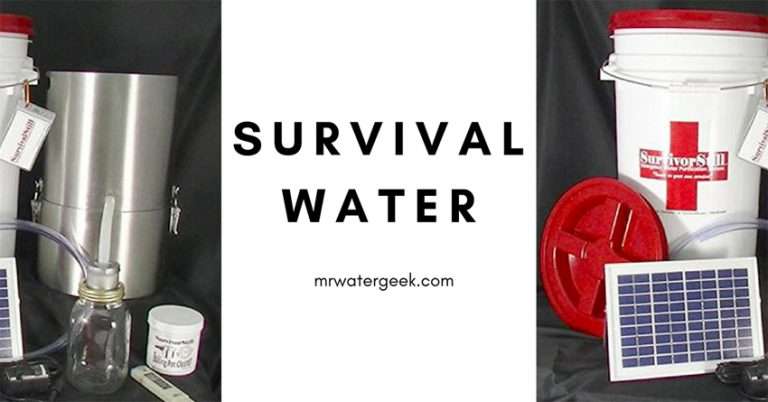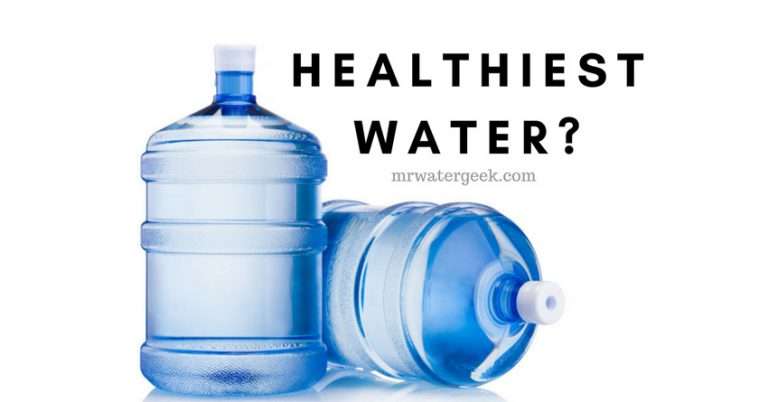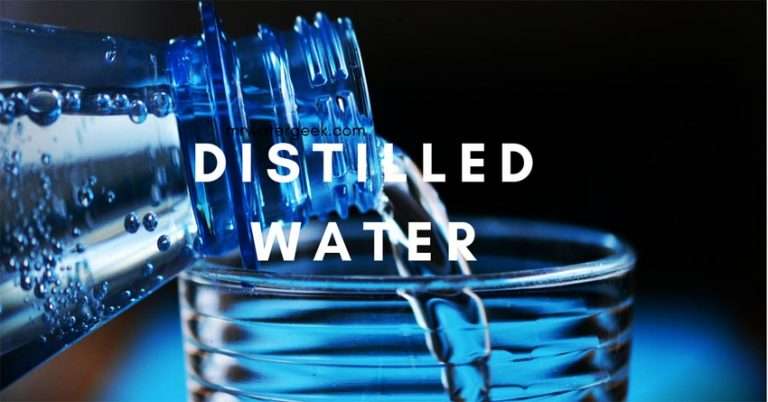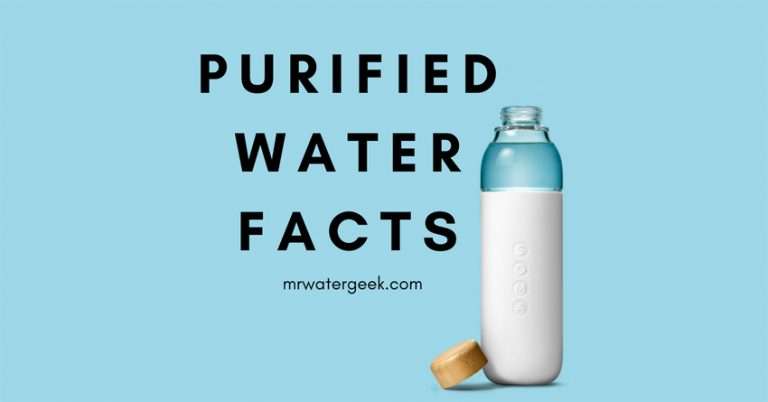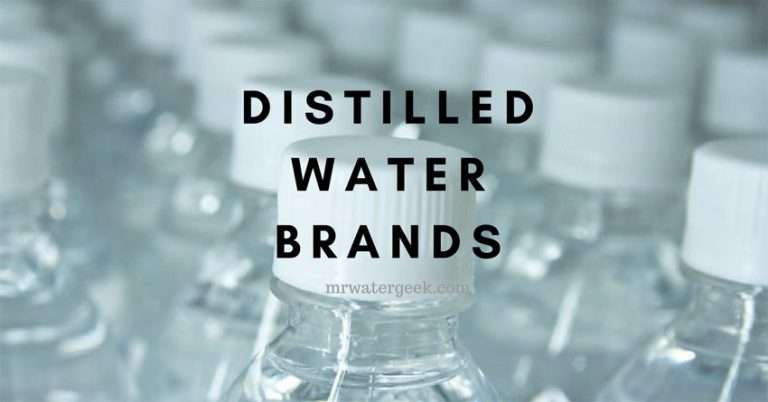Distilled Water vs Purified Water? Here Is What The Experts Say.
Distilled Water vs Purified Water? Well, for better or for worse, there are so many different kinds of water that you can buy today. The choice is ridiculous and some might say unnecessary.
Today, you can buy everything from spring, purified, filtered, hydrogenated, reverse osmosis, distilled and alkaline water.
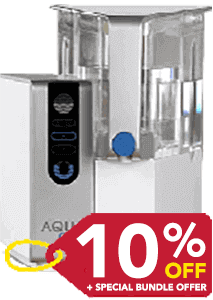 This doesn’t even include the bewildering amount of different machines, appliances and devices that you can buy to produce these different water types.
This doesn’t even include the bewildering amount of different machines, appliances and devices that you can buy to produce these different water types.
This is even more annoying when all you really care about is whether or not the water you buy is the best for you, right?
If this is the case, then you have come to the right place because this post will help you decide.
This article will specifically look at 2 of the most popular types of water available today and tell you everything you need to know about both.
I will use a very quick comparison analysis to help you learn the key differences. Also, by comparing them both, you will learn what each type of water offers you and thereby know which one is best for you.
What Is Distillation?
Distillation is a method of water purification that captures the steam from boiling water. All the bacteria, chemicals, debris and contaminants remain behind and this means the steam water is completely clean.
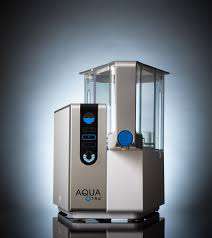 If done correctly, it is by far one of the most effective ways of purifying water. The result is water that is completely 100% pure, in fact, almost sterile.
If done correctly, it is by far one of the most effective ways of purifying water. The result is water that is completely 100% pure, in fact, almost sterile.
This is why distilled water is the water of choice when purity and cleanliness is required.
For instance, distilled water is regularly used by industries, factories, scientific laboratories and the medical profession.
Distillation is usually the purification method of choice for those who make spirits as well as places such as oil refineries.
How Does Distillation Work?
The process of distillation works because different elements have different boiling points. This means that the water steam is created at a certain boiling point, which also leaves everything else behind. 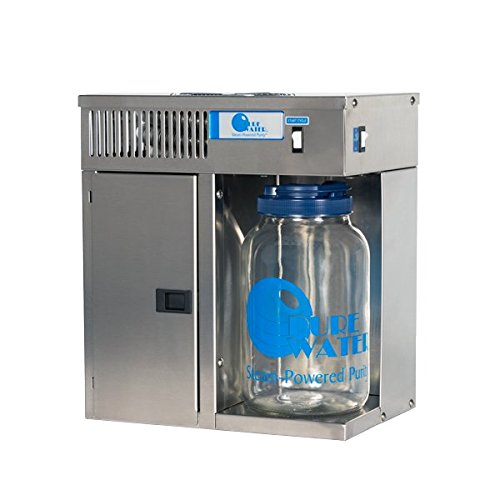
The boiling point creates the distilled water steam but is not the right temperature for both dense and non-dense chemicals as well as other contaminants.
The clean liquid that is now steam goes into a separate chamber. This chamber has to be clean because it’s where all your distilled water will be stored.
The secondary chamber also has to have some sort of cooling mechanism to convert the clean purified steam back to liquid.
Different industries use the distillation method in different ways. For instance oil refineries use distillation as a way of separating crude oil and turning them into different liquids like paraffin, asphalt and gasoline.
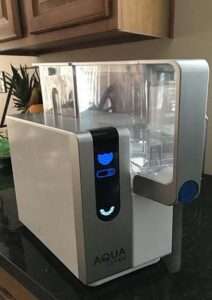 Gasoline is particularly interesting because of its incredibly low boiling point.
Gasoline is particularly interesting because of its incredibly low boiling point.
This makes it easy to quickly separate crude oil away from gasoline. Its low boiling point is also what makes it useful as automobile fuel.
Asphalt, on the other hand, needs an even higher boiling point. this is the reason why it doesn’t start to get solid very quickly on roads even on the hottest days.
What Is Water Purification?
In very simple terms, water purification is any process that removes impurities from water. This is why the distilled water vs purified water debate is a little bit confusing.
Distillation IS a form of purification!
But broadly speaking there are 3 main different types of purification:
- Biological form of purification, which includes the removal of parasites, pathogens and bacteria.
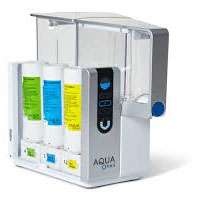
- Chemical water purification that removes impurities like detergents and pesticides.
- Water purification of physical items like debris, sand, dust and other particles.
The type of impurities that need to be filtered all depend on the water source. For instance, the purification needs for sewer water are very different for the needs of ocean water.
The different needs of different water sources is the reason why there are so many different purification methods. This is because each method has unique capabilities.
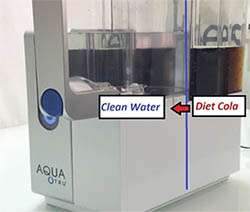 Government agencies and external standards regulate the level of water quality.
Government agencies and external standards regulate the level of water quality.
They do this looking at a magnitude of micro grams in terms of solids per liter of water. This translates to very tiny trace amounts.
The specific purification method and process all depends on your purification equipment, device and appliance. Some devices specialize on working in emergency situations and others are designed to be used for homes.
Different Purification Methods Of Water
- Filtration Is A Form Of Water Purification
- Boiling Is A Form Of Water Purification
- Granular Activated Carbon Is A Form Of Water Purification
-
Reverse Osmosis Is A Form Of Water Purification
-
Bioremediation Filtration Is A Form Of Water Purification
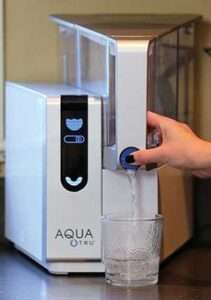 Yes, you read the correctly. Distillation is a form of water purification.
Yes, you read the correctly. Distillation is a form of water purification.
It is “purification” instead of “filtration” because it doesn’t actually filter anything out in the traditional sense.
Distillation actually purifies the water i.e. separating water from impurities through a heating process instead of cleaning the water with a filter.
1. Filtration Is A Form Of Water Purification
The simple act of filtering water transforms it to water that is purified. This can be as basic as using a sieve filter to remove debris from water.
For instance, reverse osmosis works by using membranes to filter out any physical contaminants.
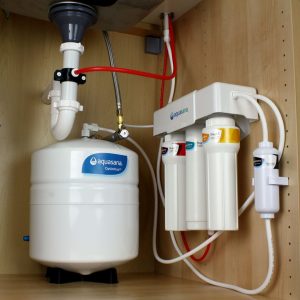 It’s also interesting that these membranes are called “filtrate” and some filters have many layers sandwiched together.
It’s also interesting that these membranes are called “filtrate” and some filters have many layers sandwiched together.
This lets every layer to allow water to pass through, with the bigger items getting filtered out by the bigger holes.
The final water quality all depends on the quality of filter that you use. There are some water filters that are only capable of filtering larger particles of debris like sand.
While there are other filters which are more advanced that are capable of removing very harmful things like chemicals.
2. Boiling Is A Form Of Water Purification
This is one of the fastest, cheapest and oldest forms of water purification. You probably know this method well and use it on occasion.
Water purification by boiling it works by killing any microbes that can cause you illness. This works because most bacteria doesn’t survive below boiling point.
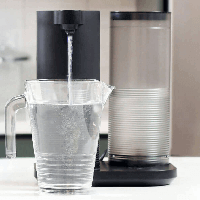 However, if the water contains very toxic or very dangerous chemicals then you should probably filter it further after boiling.
However, if the water contains very toxic or very dangerous chemicals then you should probably filter it further after boiling.
This is because liquid chemicals don’t evaporate at boiling point so boiling heavily contaminated water is not effective.
Boiling water as a form of purification is only really effective if the water is already relatively clean.
For instance, boiling water is a good idea for tap water or water that is already pretty clean but you just want to be sure.
3. Granular Activated Carbon Is A Form Of Water Purification
To put it simply, Granular Activated Carbon or GAC is the same things as a “charcoal water filter”. It is a filtration process that filters water by using charcoal activated carbon.
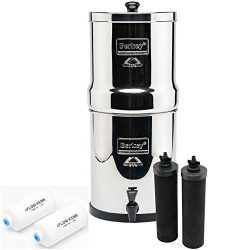 You might already be thinking it and yes, the charcoal described here is the same charcoal that you get when you burn wood. To make it “activated”, you need to oxidize it somehow perhaps with oxygen.
You might already be thinking it and yes, the charcoal described here is the same charcoal that you get when you burn wood. To make it “activated”, you need to oxidize it somehow perhaps with oxygen.
GAC or activated charcoal is a great way to purify water for so many reasons. The first is that it’s very good at removing all types of impurities. This can include things like microscopic contaminants, bacteria and microbes.
GAC filters are also good at neutralizing smells because the carbon is able to react with lots of different odor-causing chemicals.
This leads on to another benefit of using a carbon filter is that it makes the water taste great and retains its minerals. Activated carbon is a natural substance and as such adds healthy minerals back to the water it’s filtering.
Read: Here is why activated charcoal will change your life
4. Reverse Osmosis Is A Form Of Water Purification
Reverse osmosis (or RO) is another form of water purification. It is very similar to the activated charcoal in the sense that it filters water through a membrane/filtrete.
The main difference is that an RO water filter system forces the water through the membrane.
While other filter systems gently let water flow freely through the filter, usually with the help of gravity.
5. Bioremediation Filtration Is A Form Of Water Purification
Bioremediation is a water purification method that makes use of the naturally-occurring organisms to filter water by breaking down bacteria into substances that are less toxic.
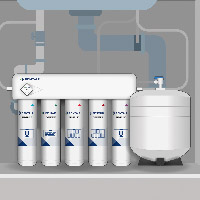 This form of water filtration (i.e. bioremediation) is popular with septic systems and sewer treatment plants. These types of water sources are very toxic to say the least.
This form of water filtration (i.e. bioremediation) is popular with septic systems and sewer treatment plants. These types of water sources are very toxic to say the least.
The sewage from septic systems are likely to be full of sulphides and nitrates from human waste. This also means that bacteria and fungus do very well in this type of environment.
This method of purification is powerful enough to deal with this level of contamination.
This makes it ideal for dealing with water that is contaminated with things like sulphides, nitrates and even heavy metals like lead.
Is Distilled Water The Same As Purified Water?
Yes, it is.
This is almost a trick question because distilled water is a form of purified water.
Distillation is one way to purify water but so are other ways like reverse osmosis, carbon filtration and other methods of cleaning water.
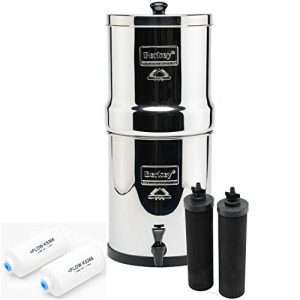 The thing you should be weary of is that even though they are the same thing (technically at least) they are not interchangeable.
The thing you should be weary of is that even though they are the same thing (technically at least) they are not interchangeable.
Purified water can be many things but distilled water is only ever one thing.
So the bottom line is don’t assume buying purified water means you will get distilled water, because it might not. Always check the water filtration / purification method if this is important to you.
Purified Water Vs Distilled Water
| What They Have In Common | How They Are Different |
|
|
Uses Of Distillation
Unlike purified water, distilled water has many different uses other then just drinking. This is due to it’s high level of purity and the fact that it’s guaranteed to not contain anything other than the purest water.
LABORATORIES: The highest standards of cleanliness are needed to maintain the integrity of the work done in labs. As a result, they can only use materials and equipment that have no chance of interfering with their experiments.
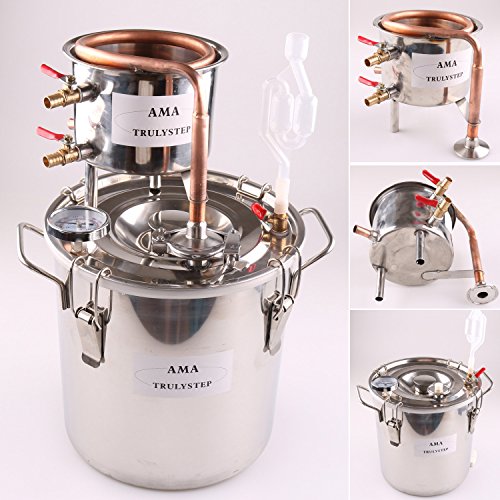 This includes things like the water used in research studies.
This includes things like the water used in research studies.
Distilled water is 100% contaminant free and doesn’t even include any minerals or nutrients so perfect for important scientific testing.
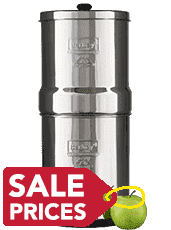 There are not many other types of water that produces water that are completely devoid of chemicals or minerals.
There are not many other types of water that produces water that are completely devoid of chemicals or minerals.
IN HOSPITALS AND FOR MEDICAL PURPOSES: Dealing with open wounds, surgery and anything to do with treating ill people requires a high degree of sanitation.
Any thing that can contain germs or bacteria can be very harmful to someone with a lower immune system undergoing surgery.
 This is why a variation of distilled water is the water of choice by the medical profession.
This is why a variation of distilled water is the water of choice by the medical profession.
AT HOME: Distilled water has many uses in the home because of its high level of purity.
Many people like to use it to make baby formula since babies’ immune system and digestive organs are still in development.
Some people also use it for cleaning since it wont create any white limescale spots since it’s not hard water.
Distilled Uses… Continued
FOR COOKING: Do you want to retain the taste of your food when cooking? The quality of your tap water (especially if you have old plumbing systems or hard water) can effect the taste of your food and hot beverages.
It’s also worth noting that some old plumbing systems can add mineral deposits or put germs into your tap water. Installing a whole house water filter will avoid all of this but so will using distilled water.
DISTILLED WATER FOR MOTOR VEHICLES: Believe it or not, your car needs water too. For instance, your car has a cooling system to make sure the engine doesn’t over heat.
Using distilled water is one effective way at preventing any sort of clogging or deposits that can corrode the internal parts of your car.
FOR GARDENING: Do you have green fingers? If yes, then you may want to consider using distilled water. Especially if you want to control the pH of your soil or maintain the chemical composition.
There are some very sensitive plants that are affected by even the slightest trace of chlorine in your tap water.
Distilled Water vs Purified Water – Which Is Better?
So to conclude the distilled water vs purified water debate, let’s look at how they are similar.
Purified and distilled water are both safe and effective in equal measures.
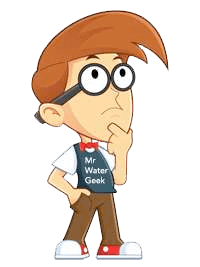 Both of them will provide you with a perfectly good and sufficient amount of hydration.
Both of them will provide you with a perfectly good and sufficient amount of hydration.
So if you’re just looking for a good cup of water then either distilled or purified water will be good.
Well, purified water has the possibility of retaining healthy nutrients, minerals but some germs too. While distilled water will always contain no minerals but be 100% bacteria free.
 A mineral free water (i.e. distilled) is not necessarily good or bad for you. So it is usually accused of being “empty” and sometimes tastes flat as a result.
A mineral free water (i.e. distilled) is not necessarily good or bad for you. So it is usually accused of being “empty” and sometimes tastes flat as a result.
But it is really good if you want empty and completely pure water. This is why high-tech facilities like factories, medical institutions and laboratories prefer distilled water.
Which is best for your body? Purified water is technically better for your health and body. This is because it is more likely to contain more of the minerals that your body needs.
 But if you don’t like how purified water tastes or simply don’t want minerals then making use of distilled water is your best bet.
But if you don’t like how purified water tastes or simply don’t want minerals then making use of distilled water is your best bet.
Scientific References
The list below are all the resources used to produce this distilled water vs purified article:
Balke KD. Surplus or Absence of Chemical Components in Water and Its Consequences for Public Health. In: Balke KD, Zhu Y, editors. Water and Development. Beijing, China: Geology Press; 2003. pp. 36–42. ISBN 7-116-03831-0/X·17.
Samuel B. Ellis, Samuel J. KiehlJ. The Purification of Water and its pH Value American. Chemistry. Society., 1935, 57 (11), pp 2145–2149DOI: 10.1021/ja01314a029Publication Date: November 1935
Erica K. Jacobsen, Water Filtration. Journal of Chemical Education, Madison, WI 53715. J. Chem. Educ., 2004, 81 (2), p 224A. Publication Date (Web): February 1, 2004
Ahsan, Amimul. (2015). Journal of Desalination and Water Purification. Journal of Desalination and Water Purification.
Balke KD, Zhu Y. Sources of Water Pollution. In: Balke KD, Zhu Y, editors. Water and Development. Beijing, China: Geology Press; 2003. pp. 3–9. ISBN 7-116-03831-0/X·17.
Eftekhar B, Skini M, Shamohammadi M, Ghaffaripour J, Nilchian F. The Effectiveness of Home Water Purification Systems on the Amount of Fluoride in Drinking Water. Journal of Dentistry. 2015;16(3 Suppl):278-281.
Isogai A, Nakagaki H, Hanaki M, Tsuboi S, Morita I, Osaka C. Use of fluoridated dentifrice and glucose retention at the approximal areas of anterior teeth. ASDC J Dent Child. 2001; 68: 42–46, 12.
Eskandarpour A, Onyango MS, Ochieng A, Asai S. Removal of fluoride ions from aqueous solution at low pH using schwertmannite. J Hazard Mater. 2008; 152: 571–579.


